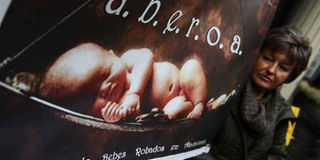Historic ruling puts State, adoption groups on the spot

A woman stands next to a sign with a message that is anti-children trafficking. A foreign couple has been blocked from adopting a child in Kenya. PHOTO | AFP
What you need to know:
- The High Court in Nairobi ruled that the child had been irregularly adopted by aliens and ordered the child taken from a foreign couple and returned to her Kenyan family.
- Lady Justice Rose Ougo however said evidence of fraud, negligence or incompetence on the part of those involved had not been demonstrated in court.
- The Cabinet declared an indefinite moratorium on adoption of Kenyan children by foreigners in 2014 and revoked licences to undertake them.
A historic court ruling has overturned the adoption of a Kenyan child by foreigners, putting organisations handling vulnerable children on the spot.
The High Court in Nairobi ruled that the child had been irregularly adopted by aliens and ordered the child taken from a foreign couple and returned to her Kenyan family.
It is the first known case in Kenya where parents went to court to reverse an adoption and stop their child from being taken out of the country without their knowledge or consent.
Diverse agencies in the past alluded to child trading and trafficking involving Kenyan and foreign nationals, but it is the first time a court process has terminated a process to take children from Kenya to foreign countries, given a face to those involved and brought to light how it happened.
Court records show hundreds of children have been taken out of the country under inter-country adoption laws over the years, with a sharp rise since 2005 when the law allowed private adoption agencies to operate.
The ruling raised the spectre of many more children having been irregularly shipped out undetected, until an experts committee set up by the State in 2015 gained access to adoption files and stumbled on anomalies during an audit that led to the court case.
Many others were still in the compliance audit pipeline.
Lady Justice Rose Ougo however said evidence of fraud, negligence or incompetence on the part of those involved had not been demonstrated in court, but observed this when she terminated the adoption process: “To term this fraudulent, in my view, is improper. It could be an omission that they (the adoption society) did not look at the police OB.”
While the Kenya Children’s Home Adoption Society submitted to have relied on information from the Naivasha police station to arrange for the adoption after failing to trace the birth family of the child, the Child Welfare Society of Kenya used the same information from the same police station to trace the family.
MISSING CHILDREN
The Cabinet declared an indefinite moratorium on adoption of Kenyan children by foreigners in 2014 and revoked licences to undertake them.
In her ruling, Justice Ougo declared adoption certificate serial number 1207, the legal instrument used to declare the child free for adoption by the adoption society, null and void.
The four-year-old girl (name withheld for legal reasons) was last week re-united with her family by the Child Welfare Society of Kenya which had been granted temporary custody of the minor by the court during the proceedings.
Judgment was made on December 21 last year and orders issued on December 23.
The Danish couple had received the child from the Kenya Children’s Home Adoption Society, which had declared the child abandoned and orphaned, and hence available for adoption.
The couple, Mr Jeppe Osteroskor Ekstrom and Mrs Annika Matilda Broberg Ekstrom, had taken custody of the child and were in the process of seeking final adoption orders to take the child with them before the parents found out and went to court to stop it.
The child had ended up in the hands of the adoption society from the Naivasha police station, where she had been taken by well-wishers after she got lost in early 2014, according to court documents.
She was about two-and-a-half years when she went missing, and a report made to the same police station vide Occurrence Book Number (OB. NO).22/16/7/2014, according to court papers.
The case is bound to attract the interest of Kenyan families that are still searching for their missing children who, it may turn out, have already been shipped out to foreign lands and their names and citizenship changed.
The case also puts state agencies on the spot, especially after it emerged in court that the case was processed at a time the Cabinet had already imposed a moratorium suspending all foreign adoptions of Kenyan children.
CRUCIAL INFOMATION
A Cabinet briefing released to the media on the moratorium declared in November of 2014 said the government took the action to investigate reports of cartels and child trafficking rings selling Kenyan children under the guise of inter-country adoptions.
Then Cabinet Secretary for East African Community, Labour and Social Protection, Kazungu Kambi, appointed an experts committee to investigate, inquire and report on the status of the adoptions practice in Kenya, and propose legal and policy reforms needed to curb abuses and enhance child protection.
Although the moratorium was still in force, the Children’s Department, through the National Adoption Committee, allowed the process to proceed until the court intervened.
The case also has international ramifications as Kenya is a signatory to The Hague Convention of the Rights of the Child that guides both “sending and receiving” countries involved in inter-country adoption, but which has now been judged insufficient in protecting Kenyan children, if not complicit in providing legal cover for violations.
The foreign couple relied on the Kenyan Adoption Society to arrange for the adoption – for an unspecified amount as fees – and were unaware of the parents of the alleged abandoned and orphaned child being alive, until they showed up with court orders to surrender the child to Kilimani Officer Commanding Police Station.



